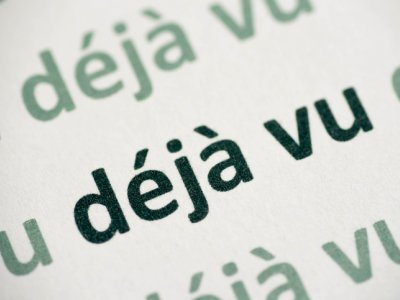 Déjà vu roughly translates from French to ‘already seen.’ The feeling occurs when we find ourselves in a situation that feels familiar, and we have the overwhelming sense that it's all happened before.
Déjà vu roughly translates from French to ‘already seen.’ The feeling occurs when we find ourselves in a situation that feels familiar, and we have the overwhelming sense that it's all happened before.
For example, when visiting a bookshop in a new city, you might suddenly feel like you’ve been there, in that particular store, engaged in that precise conversation before.
There are many different hypotheses about what triggers this unusual sensation. One popular explanation is that déjà vu is triggered by situations that are similar to a previous experience, but you can't pinpoint the exact source of the experience. For example, you might have met someone who looks nearly identical to somebody you know and experience an eerie feeling of familiarity. Likewise, with déjà vu, if you find yourself in a very familiar situation—but can’t identify the source of the familiarity—you might jump to the conclusion that it's happened before. Given the vast number of situations that people experience over a lifetime, including all the movie scenes, pictures, videos, and mental images we create when reading novels, it is no surprise that this large bank of memories can usually be brought back by the right circumstances, but it’s not going to be perfect.
There are plenty of other ‘vus' out there. For example, there’s “Presque vu” (French: “almost seen”), and refers to the tip of the tongue phenomenon. For example, when you hear a song and you’re absolutely certain that you know the name, but just can’t quite bring it to mind. There’s also “Jamais vu” (French: “never seen”), and describes something that should be completely familiar to you, but it feels like you’re seeing it for the very first time. An extreme but rare version of this phenomenon occurs in people suffering from Capgras syndrome, who can actually feel like their loved one has been replaced by an imposter because they suddenly feel like they’re seeing the person for the first time.
Everyone knows what it feels like to experience a strong sense of familiarity. Most of the time we can easily pinpoint the source of the song, smell, face, or taste that gave rise to that feeling. In our research, we’re interested in situations where familiarity points to the wrong source—just like déjà vu. In particular, we’re conducting experiments on sudden and powerful “Aha!” or lightbulb moments that turn out to be incorrect. Given the myriad thoughts that appear in our minds at any given moment, it is interesting to know why some thoughts and ideas are dismissed as meaningless distractions while others are grasped as significant or profound. Our aim is to better understand how to calibrate our feelings of familiarity (and Aha!) so we can teach people to better distinguish between true and false information.
AUTHORS: Ruben Laukkonen, Hilary Grimmer, and Associate Professor Jason Tangen are based in the UQ School of Psychology. Ruben will be heading to Amsterdam in October to begin a postdoctoral fellowship working on meditation and the predictive brain. Hilary is an honours student in Jason’s lab investigating whether false insights make people more likely to believe fake news stories. Jason’s research is based on the development of expertise and he offered UQ's first Massive Open Online Course called The Science of Everyday Thinking, which has now attracted more than 500,000 enrolments.



